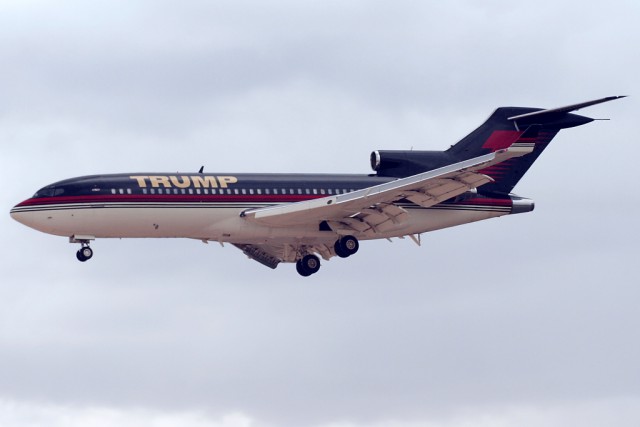
The threats to Asia’s future peace of mind: China versus the US, the South China Sea, North Korea—and then there’s Trump.
The Donald is a powerful reminder of the fundamental duality in Asia’s responses to the protections and pressures of the US.
The constant questions about the strategic guarantor go to its strategic strength and the constancy of the guarantee. Trump gives those questions the shrillest edge.
It can be maddening and galling and scary—even for allies and quasi allies—to be pushed around by the Americans. Maybe only one thing is worse—if the Americans departed from Asia.
The greatest peacetime threat to the US alliance system in Asia will come from the US itself—by what it demands or fails to deliver.
Donald Trump encapsulates those conundrums in confronting ways.
Being pushed or threatened by The Donald would be unpredictable and nerve-wracking. What sort of deals would he demand?
The nightmare scenario is that Trump mightn’t have an open mind about Asia, but an empty mind.
Instinct can take you only so far. What if Trump gets a chance to act on his instinct that US alliances in Asia are all give and little get?
The US presidential election has certainly changed the buzz at the annual strategic talkfests in Kuala Lumpur and Singapore. For the first time this decade, it wasn’t all about China.
Come coffee time, Trump is the top trending topic. Not only is Canberra barracking for Hillary, so is most of Asia. Even China can’t decide whether to be delighted or alarmed.
As an example of the cycle of negatives that have Asia in a spiral consider this: North Korea calls The Donald wise and far sighted even though he’s promised to take out the North’s nukes and make Kim Jong-un disappear. Oh, me. Oh, my. Oh, dear.
The reassurance from slightly-embarrassed American wonks is that the US alliances in Asia are between states and governments, not an individual leader. True. But US presidents can make the weather.
A Trump presidency would mean Australia faced a New York doctrine as consequential for our strategic thinking as Richard Nixon’s Guam doctrine.
As Nixon struggled to extract the US from Vietnam, he used a press conference in Guam to announce the terms of the dialogue he’d been having with Kissinger. Henceforth, Nixon announced, US allies would have primary responsibility for their own defence.
No longer would the US bear any burden or pay any price. Nixon didn’t actually do that rebuttal of Kennedy’s inaugural, but that was the message.
Even Kissinger was surprised at Nixon doing it there and then. But the Guam Doctrine it became and it had a huge impact on Australian thinking and planning.
Oz defence ‘self reliance’ was born and has throbbed ever since, in word if not always in deed or dollars.
Trump’s New York doctrine would be delivered in dollar-speak—Guam done from Gotham. Something like: ‘We’re broke. We won’t pay. Now you pay.’
Do the monologue in that NYC accent: Good luck South Korea—65 years is enough. Japan, you know you can afford it. What have the Philippines or Thailand done for us lately? And where is Australia exactly?
Kim Beazley reckons that President Trump would force Australia to redo the 2016 Defence White Paper. In that urgent rewrite early next year, ‘the strategic sections will look very different. We won’t be able to make assumptions about American forward policy.’
Peter Jennings thinks confronting The Donald in ‘we won’t pay’ mode would force Australia to double defence spending from 2% to 4% of GDP.
Now that really is dollar-speak.
Shift from the multi-billion dollar stratosphere to the ‘small change’ that has turned into a mammoth wrangle between Australia and the US—the cost of new housing, toilets and sewerage to be used by the US Marines in the Northern Territory.
The argument is over a sum of about US$150 million.
The struggle—the dunny deadlock—has dragged on so long it has derailed the timeline for the US deployment, knocking sideways the key Australian element of the pivot.
Not enough toilets mean the US is pushing back the schedule to double the annual rotation from the current 1,250 Marines to a 2,500-strong Marine Air Ground Task Force.
Imagine President Trump’s response to that briefing: ‘They won’t even pay for our guys to have a #@&!’
Segueing from toilets to trade, Trump has made trade deals so toxic for the Republicans that he’s sinking the agreement for the Trans-Pacific Partnership.
If the TPP is to be ratified, it’s up to President Obama to get the job done in the last days of this Congress; get it through in the lame duck days or see it treated as a dead duck.
The trade toxins will take years to clear. The fast track authority for the TPP lasts six years, till 2021. That’s both blessing and curse.
Getting the TPP passed by Congress could end up being a job for the President elected in 2020.
The impact of Trump. Even if he doesn’t win—as Asia fervently hopes.

